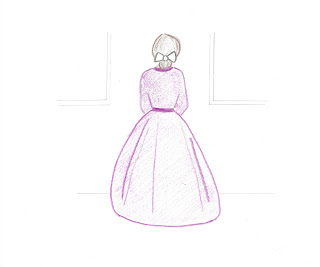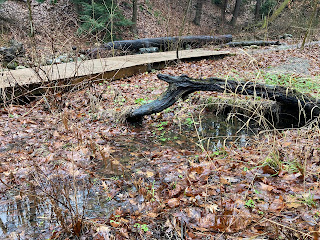A Rainy Bridge Tour Brightened My Day
I Visited the Ashtabula County Covered Bridge Festival
By Anna Krejci
My spouse and I toured the covered bridges in Ashtabula
County this past Sunday. The nippy October air was perfect for wearing sweaters,
and trees with vibrant red and orange leaf color surrounded us as we traveled
up the highway to Jefferson, a small village in Northeast Ohio near the
Pennsylvania border. Heavy, gray clouds hung low on the horizon. The above looked so interesting on this day.
Slight openings in the clouds revealed the partially obstructed blue sky and
rays of sunlight poured through, somehow making the clouds look very
dimensional and thick.
Rain was coming. Usually, rain on my excursion day dampens
my spirits, but this time it helped me see the purpose and functionality of
several nostalgic-looking covered bridges in the county. Covered bridges were built with roofs
overhead to shield the wooden beams, trusses, and floor from the weather,
including rain that would cause the parts to rot and weaken. While I think
covered bridges in the countryside appear quaint, first and foremost, they were
practical and purposeful. A 2014 book called “The Covered Bridges of Ashtabula
County,” was an interesting read; many of the bridges discussed dated back to
the 1800s. In it, Carl E. Feather explains the rationale among the past
residents regarding bridge building: taxpayer money was used, so it had to be
spent wisely and thriftily. Feather stated that many of the bridges even lacked paint.
Some of the bridges in the county have been refurbished and
some are even relatively new construction. My husband and I visited the Caine
Road bridge built over the West Branch of the Ashtabula River. It was built in
1986, and we saw the Netcher Road bridge that crossed Mill Creek and that was
built about 25 years ago, according to the book. The third and final bridge we saw was the
Doyle Road bridge, which had a much longer life than the previous two. Even as
it rained on the outside of the bridges, I could feel the dryness when I walked
inside of them. I could see how the covering worked so well at keeping the rain
out. The inner workings of the bridges are quite impressive to see. The braces
crisscross one another and create such a spatial network of support. It is
artistic in a way that is also architectural and structural. The Doyle Road
bridge had arches interiorly that had been added during a 1987 renovation to
improve upon the trusses, Feather wrote in his book. I thought the arches
looked smoothly formed and graceful. All parts of the bridges had a purpose.
Our self-guided tour of the bridges coincided with the Ashtabula County
Covered Bridge Festival, held each year on the second weekend in October. The county’s fairgrounds in Jefferson served
as a home base for the festival. Vendors
sold their goods; there were food trucks, music concerts and more activities. We had good shelter from the rain in the fair
buildings.
In one of the fair buildings, I met Tammy Bevan, who owns
Aurora Design. She also operates Best Friends Forever, where she and her
long-time friend do laser engraving and artwork. On Sunday, Bevan staffed a table filled with
wooden ornaments, wall decorations and pieces set on shelves or tabletops. Wood
is so sturdy and long-lasting, especially when it is cared for. I picked up a small stand in the shape of a
triangular evergreen tree. We also
looked at several ornaments, also made from wood. The two stands we purchased were painted in
tones of green. The ornament we got was mostly natural wood color, but its
design displayed bare, winter tree trunks and branches painted with touches of
white to resemble the snow. Here was some wood that was adorned, unlike some of
the plain, albeit sturdy and functional, bridges that we saw on our tour.
Bevan kindly explained why she and her good friend paint
their artwork. “I would say that when we paint our work, first that it is an
expression of our inner selves, and we also love that it evokes feelings in
others. [Here is] a quote I love that is relevant: ‘The external world is a
canvas where you paint with the colours of your soul.’” Bevan quoted from the author
Michael Beckwith. When asked how she and her friend paint their artwork, she
replied, “We just start painting until we love what we see, and we also
sometimes meld each of our ideas making one unique creation.”
It kept raining on my spouse and me during our return ride,
and the wooden covered bridges provided a safe passage for us. I was thinking about where at home to display
the wooden ornamentation we found. Wood can be a blank surface to paint upon,
and it can be part of a bridge. The
plain bridges contrasted with the adornments on painted wood, but both formed
rich memories of the day.
For more information about the Ashtabula County Covered Bridge Festival, click on the link below.
https://coveredbridgefestival.org/
Works Cited
Feather, Carl E. The Covered Bridges of Ashtabula County,
The History Press, 2014, Charleston, SC.




